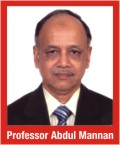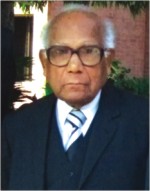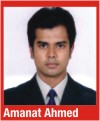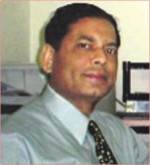| Spotlight
A Small Tribute to a Great Teacher

 Justice Kazi Mehboob Sobhan, popularly known as Justice K M Sobhan died on the last day of a very eventful year, 2007. He was 82 when he breathed his last. Justice Sobhan had an illustrious and eventful life. He was a successful practicing Barrister in the High Court of Dhaka in the late fifties through sixties. Immediately after the liberation of Bangladesh he was appointed a judge of the High Court division of the Supreme Court of Bangladesh. Justice Sobhan was also appointed the Chairman of the 'Rehabilitation of the War Ravaged Women.' He also served as the Bangladesh's Ambassador to East Germany and Czechoslovakia. After his retirement he got involved in many Human Rights Organization. His involvement with the movement for trial of war criminals and crime against humanity shot him into a new limelight. Whenever the country's democracy was in danger and the existence of democratic institutions was threatened Justice Sobhan never shied away from making his voice heard, sometimes coming down on the street if the situation demanded. Even a day before his sad demise Justice Sobhan in a meeting of the 'Sector Commander's Forum' held in Dhaka demanded the trial of the war criminals of 1971. When Justice Sobhan's dead body was lying in the Central Shahid Minar on January 3rd for all walks of people to pay their last respect, Nasiruddin Yousuf Bachhu and others were narrating the illustrious life of late Justice K M Sobhan. However, it seems the commentators on that day or the numerous articles that appeared on Justice Sobhan after his demise failed to mention the fact the Justice Sobhan was a very successful teacher in Dhaka University in the sixties and played a very important role in establishing the Commerce Faculty of Dhaka University. Justice Kazi Mehboob Sobhan, popularly known as Justice K M Sobhan died on the last day of a very eventful year, 2007. He was 82 when he breathed his last. Justice Sobhan had an illustrious and eventful life. He was a successful practicing Barrister in the High Court of Dhaka in the late fifties through sixties. Immediately after the liberation of Bangladesh he was appointed a judge of the High Court division of the Supreme Court of Bangladesh. Justice Sobhan was also appointed the Chairman of the 'Rehabilitation of the War Ravaged Women.' He also served as the Bangladesh's Ambassador to East Germany and Czechoslovakia. After his retirement he got involved in many Human Rights Organization. His involvement with the movement for trial of war criminals and crime against humanity shot him into a new limelight. Whenever the country's democracy was in danger and the existence of democratic institutions was threatened Justice Sobhan never shied away from making his voice heard, sometimes coming down on the street if the situation demanded. Even a day before his sad demise Justice Sobhan in a meeting of the 'Sector Commander's Forum' held in Dhaka demanded the trial of the war criminals of 1971. When Justice Sobhan's dead body was lying in the Central Shahid Minar on January 3rd for all walks of people to pay their last respect, Nasiruddin Yousuf Bachhu and others were narrating the illustrious life of late Justice K M Sobhan. However, it seems the commentators on that day or the numerous articles that appeared on Justice Sobhan after his demise failed to mention the fact the Justice Sobhan was a very successful teacher in Dhaka University in the sixties and played a very important role in establishing the Commerce Faculty of Dhaka University.
In 1967 Justice Sobhan, known as 'Barrister Sir' to his students and colleagues came to teach us Business Law. He was one of the few part time teachers that the Commerce Department retained those days. Today's Commerce Faculty in those days was Commerce Department under the Faculty of Arts. Professor Syed Sazzad Hossain was the Dean and Dr. Osman Gani (father of former education minister Osman Farukh) the Vice-chancellor of Dhaka University. Appointments of the Deans and Head of the Departments (present day Chairman) were the prerogatives of the Vice-chancellor. One had to be in the good books of the Vice chancellor to be appointed for these coveted posts. To students of commerce, especially those who came with science or arts background law as a subject was absolutely new. Business Law was a subsidiary subject and classes were held on Fridays and Saturdays. The day of the first entry of Justice Sobhan in the class will always be remembered by his students. Not many teachers in those days (I have not seen any then) would enter the class immaculately dressed in a three-piece pin stripped suit wearing a business hat and carrying a leather carry-all-bag in the right hand. He greeted the students very politely in a typical British accent with a mild 'Good Morning' and introduced himself as K M Sobhan.
He reminded the students that the class lectures will be delivered in English as in those days practically all law books were available in English. Business Law classes of Barrister K M Sobhan had a hypnotic effect on the students. The sleepy students who came to attend the 8.30 class soon woke up to the narrative examples of Sobhan sir. In the honours class he taught Company Law and made the students buy the original version of Company Law instead of a standard textbook. He wanted the students to get a glimpse of what an original government published law book appeared like. He would often cite examples from English legal proceedings and expected the students to go to the British Council and write the complete facts of the cited cases.
He would often tell the class that the time he spent in the university with the students was the best time of his day. As said, he would always be smartly dressed but he was in his best the day he would come in bow. Not many teachers of Dhaka University in the sixties came in chauffer driven cars. Justice Sobhan did. However one thing bothered him much and he would always share that with his students.
The part time faculty members used the Commerce Museum as their office. Justice Sobhan thought only historical relics should be kept in museums and not university teachers!
In 1970 the students of the Commerce Department of Dhaka University started a movement for converting the Department into a separate faculty. It did not have many supporters outside the commerce department. The movement leaders campaigned amongst the department teachers and met the Head of the Department Dr. Abdullah Farukh. Though initially there were differences of opinion whether the department should be converted into a separate faculty Dr. Farukh agreed to meet the Vice Chancellor Justice Abu Syed Chaudhury and requested him to consider the demand of the students. Most of the teachers silently supported the movement. Eventually the proposal for the creation of a new faculty called Faculty of Commerce was tabled in the Academic Council to be turned down. The proposal was vehemently opposed by quite a few influential members of the Arts Faculty and in the Academic Council the members from the Commerce Department were in the minority. Suddenly the peaceful movement of the students became unruly and office rooms of some the opposing Academic Council members were unfortunately vandalized. The university authorities agreed to table the proposal again. This time the student leaders of the movement made arrangements with the Vice-chancellor and Dr. Abdullah Farukh to invite Barrister K M Sobhan to plead the case of Commerce Faculty in the Academic Council meeting. On the day of the Council meeting Barrister sir was in his best attire. He entered the meeting with well-drafted brief and made the case. The rest is history.
The day I went to pay my last respect to our beloved Sobhan sir and while attending the Namaj-e-Janaja all these events that took place thirty-seven years back came to me as a flash. It seemed all of these things happened just the other day. 8.30 Friday-Saturday morning classes, the immaculately dressed Barrister sir, the movement for establishment of separate Commerce Faculty, the argument of the case of the new faculty in the Academic Council meeting presided over by a Justice and argued by a learned Barrister. Many present generation students will have to be quite imaginative what the days of the mid and late sixties were like and what a great person Justice K M Sobhan was. May Justice Sobhan's soul rest in peace.
The writer is a former Vice Chancellor, University of Chittagong. abman1971@gmail.com
I am Blessed

When I sat down to write about my favorite teacher, I remained undecided for a good half an hour despite a lot of brainstorming. Who is actually my most favorite teacher? Actually I am blessed with so many good teachers in my whole life up until now that if I pass the rest of my life thanking the Creator then it will be inadequate regardless of how many years are left for me.
 But, among many, there is one man whom I always admire as a teacher. I first met him in the reunion of my cadet college and later found him as my teacher in Dhaka University. He is my favorite teacher not just because of a solitary feature, but because of the whole blend of his qualities. But, among many, there is one man whom I always admire as a teacher. I first met him in the reunion of my cadet college and later found him as my teacher in Dhaka University. He is my favorite teacher not just because of a solitary feature, but because of the whole blend of his qualities.
His sincerity and diligence touched me the most. I cannot remember him missing a single class without giving a prior notice.
His punctuality is one of his best traits. No matter what the circumstances were he was always in the lecture room within five minutes of the starting time. We used to have his classes early in the morning, and even in the chilly winter season he was on time.
Each and every moment of his class was important. He used to put all the required information in his lectures in such an interesting way that we could not afford to missing out a single word or sentence. It was his excellent sense of humour that kept the class going when it tended to become boring. Getting a seat in the front row in his lecture was a real hassle as the front seats were quick to fill up. In many instances I ended up in the back bench.
He earned his Ph.D. in Economics from Moscow State University. He acted as a Visiting Fellow in Institute of Southeast Asian Studies (ISEAS), Singapore; Pakistan Institute of Development Economics (PIDE), Islamabad and Queen Elizabeth House, University of Oxford. He is a Member of Bangladesh Economic Association (BEA) and of Working Group on WTO, Ministry of Commerce, and Government of Bangladesh.
Dear readers, what I have shared with you about him is simply inadequate to describe his excellence. Because, whatever I write about him, will always be very little to justify his brilliance. You might be thinking who this person is. Well it's time for me to reveal his identity. He is Dr. Mustafizur Rahman, Professor, Department of Accounting & Information Systems, University of Dhaka and also the Executive Director of Centre for Policy Dialogue (CPD). I feel truly blessed to have a teacher like him in my life.
(The writer is a BBA, 9th batch student of the Department of Accounting & Information Systems, DU)
Copyright
(R) thedailystar.net 2008 |

